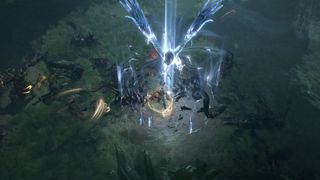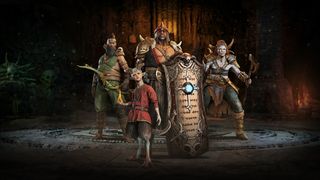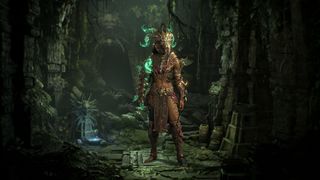
The Diablo 4: Vessel of Hatred expansion and its new Spiritborn class have got their hooks in me.
On the one hand, this expansion from Blizzard is just ‘more Diablo 4’ which is great news for fans, returning and new. On the other, this story-based downloadable content (DLC) for one of the recent best RPGs has a particular mix of elements that could prove just as moreish for you as they have for me.
Set directly after the end of the main Diablo 4 campaign, you begin pursuit of the character Neyrelle deep in the jungles of Natanyu in an attempt to uncover Mephisto’s plans. While you can re-embrace the long haul and start a whole new Diablo 4 adventure with the new Spiritborn, you can also, as I did, jump straight into the Vessel of Hatred campaign as a level one Spiritborn character and see all the content it has to offer.
I’ve spent many hours with Vessels of Hatred now, devouring its side quests, hoovering up new loot, and really getting to know the Spiritborn class, and here are some of the best bits that I’ve experienced.
1. The pace and poison of the Spiritborn

The main attraction of the DLC is arguably its new character class, the Spiritborn. This class and people are natives of the Jungles of Nahantu - more on that below - and almost trade in their human self for a spirit realm version based on animals of the jungle.
The Spiritborn are built around agility, mobility, and speed. The Spiritborn’s deployment of long weapons like glaives or polearms as a direct extension of themselves makes for some acrobatic and athletic attack moves. All the movements and attacks are incredibly fast and brilliantly fluid. Other Diablo 4 classes and builds like my rogue can, of course, be quick as well, but there’s a satisfying fluidity I’m finding with the Spiritborn, darting from target to target, and executing multi-stab attacks, that’s a fantastic change of pace.
The Spiritborn class channels four jungle ‘spirit guardian’ animals that its skills and abilities are based around: Gorilla, Eagle, Jaguar, and Centipede. Admittedly the latter doesn’t sound quite as exciting as the other three, but I’ve found that it is the source of my current favorite way to play.
Get the best Black Friday deals direct to your inbox, plus news, reviews, and more.
Sign up to be the first to know about unmissable Black Friday deals on top tech, plus get all your favorite TechRadar content.

The Centipede skills are based around poison damage, and its application in Vessel of Hatred is extremely fun - and effective. I have often found that poison damage can be a bit lackluster in games like Diablo or other action role-playing games (ARPGs). While it’s often ‘potent’ enough spec- or number-wise, it’s often pretty slow and doesn’t really deal damage effectively.
However, my Spiritborn can apply poison to enemies and see in real-time the effect it is having, depleting health bars pretty rapidly and satisfyingly. It can get a bit roguelike in the respect of ‘apply damage, dodge away, repeat’ but, complementing that, the Spiritborn can hold their own in battle through durability and life leech plus other robust attacks.
Some of my favorite skills so far are calling forth infectious swarms of bugs, an acrobatic ground pound with your glaive, throwing out eagle talons in a spiral to hit multiple enemies, and even bringing forth a centipede spirit to blast and spit at enemies.
There’s plenty of variety among the wider ‘animal-based’ skill sets and abilities that the Spiritborn has at their disposal too, but the poison damage is one that I’ve found a highlight of the class and expansion so far.
2. The lushness of Nahantu

The new area of Nahantu is a fine setting for the expansion - and a very welcome one. It’s a lush and verdant area that makes for a refreshing addition to the map with it’s jungle-aesthetic. Plants overgrow ruins and towns, waterways snake across the land, and stooping trees lean into camera shot and almost get in the way of the camera (they don’t really, but their scale and lushness provide an extra visual dimension).
Bolted onto the existing Sanctuary map, you can navigate to it as easily as any other part, but it still feels very separate from it - and fresh and new. The main Kurast area is a lush and verdant place making a nice change from the beiges, dusty reds, and barren wintriness of a lot of Sanctuary. Some of the overgrown ruins, and foliage-covered towns look like they were torn straight from an Indiana Jones movie, while the tropical forests with palm trees and huge-leaved shrubs that cover the wider landscape breathe life into the landscape.
And while the layout and overall map of the place will feel familiar and very Diablo 4-esque - with plenty of dungeons, strongholds, meandering routes, and isolated parts that require climbing or jumping to access, there’s a mystery here of the Spiritborn’s ancient civilization You’ll also find plenty of new towns.
Your adventure will also see you come across some pretty compelling new enemies, from snakes and spiders and other jungly-critters to warring tribes, and, of course, new demons and monsters. All in all, I’ve found Nahantu to be an excellent backdrop to this next installment, and one that I enjoy being in and fighting through.
3. Mercenaries make great friends

You’re not alone in your fight though, as Vessel of Hatred adds mercenaries as powerful allies that can join you almost wherever you go.
Picked up as part of quests, each is a unique character and offers their own means of supporting you - so they don’t just have one combat set to repeat over and over. Not only are they different fighting classes, but you can enhance their effectiveness by building your rapport and relationship with them by fighting alongside them. Skills become available and you can choose which they can use with each level of rapport. This is a fine enhancement of the concept and gives it a bit more depth and utility which I’ve found interesting enough to deploy.
These companions don’t say much at all while you’re out and about, which is a shame, so there’s no Dragon Age-party banter, but I've found that the fact they’re there at all and are genuinely useful in battle makes for a small and welcome boost to solo play.
More is more

Throw in some additions to armor skins, as well as new pets, and a bunch of cosmetics (depending on which edition you have), along with the chunky length of the story campaign, a PvE co-op endgame, and the introduction of runes and runewords (items that can give you access to new skills or temporary buffs) and Vessel of Hatred is, at its heart, a great way to expand the Diablo 4 experience and introduce new features in the process.
It’s a moreish mix of new combat and skills and game features, in a terrific setting and with a continuation of the quality narrative the base game had. I’m here for it, and it should firmly be on your radar this month when it releases on October 7 at 4pm PT / 7pm ET, or 12am BST on October 8 for PlayStation 5, PlayStation 4, Xbox Series X, Xbox Series S, Xbox One, and PC.
You might also like...
- Upcoming games 2024 for console and PC
- PS5 Pro pre-orders: stock is live and here's where to buy one
- Where to buy the PS5 disc drive and PS5 vertical stand: latest stock updates on both PS5 Pro accessories

Rob is the Managing Editor of TechRadar Gaming, a video games journalist, critic, editor, and writer, and has years of experience gained from multiple publications. Prior to being TechRadar Gaming's Managing Editor, he was TRG's Deputy Editor, and a longstanding member of GamesRadar+, being the Commissioning Editor for Hardware there for years, while also squeezing in a short stint as Gaming Editor at WePC just before joining TechRadar Gaming. He is also a writer on tech, gaming hardware, and video games but also gardens and landscapes, combining the two areas in an upcoming book on video game landscapes that you can back and pre-order now.